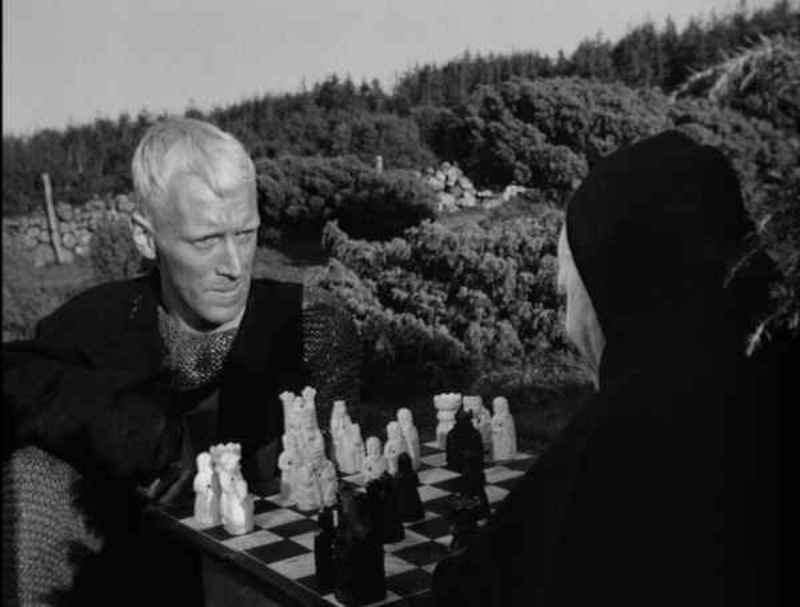
Wednesday
Like many Netflix subscribes, our family has been enthralled with The Queen’s Gambit, the miniseries featuring a woman who takes on the very male world of chess and emerges triumphant. The series has taken me back to my own early chess playing days, including the time I spent avidly following Bobby Fisher, upon whom Beth Harmon is partly modeled. It also gives me a chance to share a wonderful Ferlinghetti chess poem.
I was never terribly good at chess but nevertheless would follow the columns authored by Bobby Fisher in Boy’s Life. I remember replaying and being awed by “the game of the century,” where a 13-year-old Bobby Fisher lures his opponent into taking his queen, after which he inexorably marches to a perfect checkmate. I cheered as Fisher took down Boris Spassky.
I also remember the shock I felt with my brother David beat me, even though he was five years younger. David would go on to play in chess tournaments
Chess is often used as a metaphor for life, especially political life. (One figure is either playing chess to the other’s checkers or three-dimensional chess to the other’s tiddlywinks.) In a passage that is partially quoted in Queen’s Gambit, Thomas Huxley has written,
Suppose it were perfectly certain that the life and fortune of every one of us would, one day or other, depend upon his winning or losing a game of chess. Don’t you think that we should all consider it to be a primary duty to learn the names and the moves of the pieces; to have a notion of a gambit, and a keen eye for all the means of giving and getting out of check? Do you not think that we should look with a disapprobation amounting to scorn, upon the father who allowed his son, or the state which allowed its members, to grow up without knowing a pawn from a knight?
Yet, it is a very plain and elementary truth that the life, the fortune, and the happiness of every one of us, and, more or less, of those who are connected with us, do depend on our knowing something of the rules of a game infinitely more difficult and complicated than chess. It is a game which has been played for untold ages, every man and woman of us being one of the two players in a game of his or her own. The chess-board is the world, the pieces are the phenomena of the universe, the rules of the game are what we call the laws of nature. The player on the other side is hidden from us. We know that his play is always fair, just, and patient. But also we know, to our cost, that he never overlooks a mistake, or makes the smallest allowance for ignorance. To the man who plays well the highest stakes are paid with that sort of overflowing generosity with which the strong shows delight in strength. And one who plays ill is checkmated – without haste, but without remorse. (The bolded passage appears in the series.)
Life is hardly so logical and scientific in the eyes of beatnik poet Ferlinghetti, however. Rather than playing “always fair,” you opponent may be
bugging you with his deep eyes
or obscenely wiggling his crazy eyebrows
or blowing smoke in your face
or crossing and recrossing his legs
or her legs
or otherwise screwing around
and acting like some insolent invulnerable
unbeatable god
who can read your mind & heart
You may fantasize about beating this opponent with “some super end-game/ no one has ever even dreamed of,” but Ferlinghetti seems less optimistic than Huxley that you can pull this off.
In any event, “your move.”
Deep Chess
Lawrence Ferlinghetti
Life itself like championship chess
dark players jousting
on a checkered field
where you have only
so much time
to complete your moves
And your clock running
all the time
and if you take
too much time
for one move
you have that much less
for the rest
of your life
And your opponent
dark or fair
(which may or may not be
life itself)
bugging you with his deep eyes
or obscenely wiggling his crazy eyebrows
or blowing smoke in your face
or crossing and recrossing his legs
or her legs
or otherwise screwing around
and acting like some insolent invulnerable
unbeatable god
who can read your mind & heart
And one hasty move
may ruin you
for you must play
deep chess
(like the one deep game Spassky won from Fischer)
And if your unstudied opening
was not too brilliant
you must play to win not draw
and suddenly come up with
a new Nabokov variation
And then lay Him out at last
with some super end-game
no one has ever even dreamed of
And there’s still time–
Your move